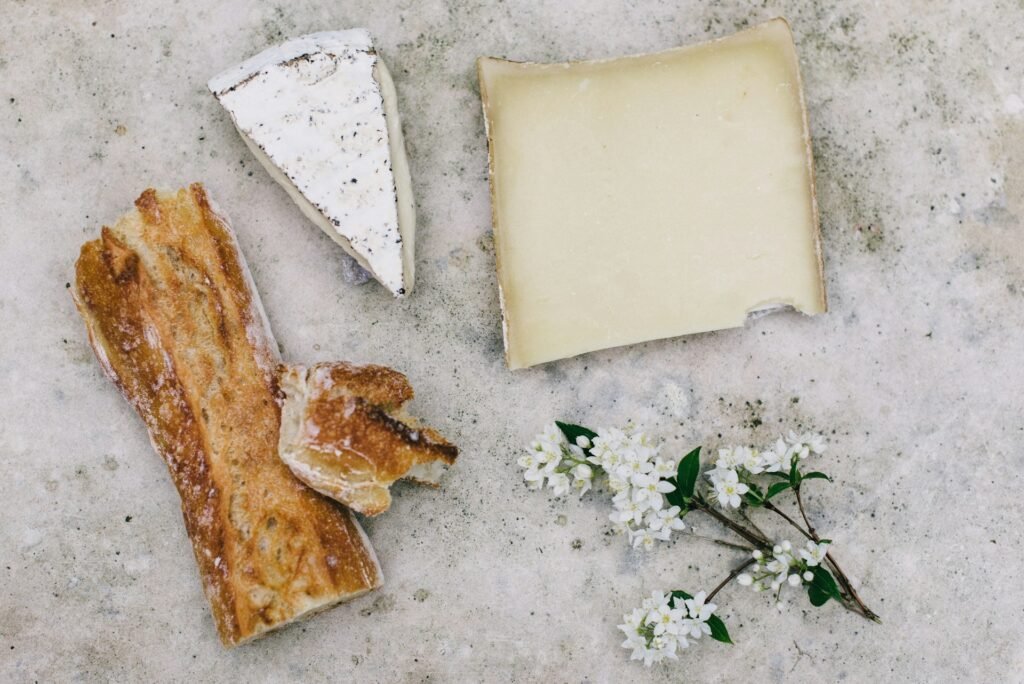Composting cheese is possible, but it requires attention to detail. Cheese can be an excellent source of nitrogen for compost bins, but it should be added sparingly to avoid problems. Used in moderation, cheese scraps can contribute to nutrient-rich compost. For those who make their cheese, compost cheese wax can serve as a fire starter or be reused in future cheesemaking. It’s important to consider the type of cheese and the amount being added so as not to overwhelm the system with leftover food.
When considering whether to compost dairy products, one must balance the potential benefits with the risks. Dairy can enrich compost with nutrients but also attract pests and create unpleasant odors. By following best practices for dairy composting, gardeners can minimize these risks and create a healthy compost environment.
Understanding the Basics of Dairy Composting
Composting dairy products like cheese is a nuanced process. Dairy can enrich compost with valuable nutrients, leading to nutrient-rich compost that benefits garden soil. However, it’s important to understand the right conditions and methods to compost dairy effectively, without causing imbalances in the compost ecosystem.

Composting Methods Suitable for Cheese and Dairy
Compost piles can be tailored to accommodate cheese and dairy waste with the right techniques and considerations, ensuring that these materials break down efficiently and safely within the system.
The Science Behind Composting Cheese
To effectively compost cheese and other dairy, an understanding of the compost system is vital. Chunks of cheese added to compost piles undergo decomposition by anaerobic bacteria, which can lead to leachate contamination if not managed correctly. Turning your compost helps to speed up the process, distributing dairy waste throughout and reducing odors. It’s best to bury dairy waste like cheese in the center of your compost to avoid attracting pests and to ensure that the compost begins its process under optimal conditions. When handling organic waste that carries bacteria, always wear gloves and wash your hands afterward.
Dairy in Compost: Balancing the Pros and Cons
Adding dairy to well-managed compost can be beneficial, but it must be managed properly to prevent issues. Organic materials like dairy need to be balanced with carbon-rich materials such as shredded paper and dry leaves to maintain moisture levels. The moisture and fat content in products like sour cream can disrupt this balance, requiring careful monitoring. In the absence of oxygen, dairy can create strong odors and attract pests, so it’s crucial to maintain a well-aerated compost environment.
Pre-Composting Preparation for Dairy Products
Before adding dairy to compost, it’s crucial to prepare it properly to ensure well-managed compost. Balancing organic materials with browns like shredded paper helps maintain moisture levels. Cutting down on the moisture and fat content in items like sour cream is essential, as these can lead to an imbalance. Materials such as shredded paper help absorb excess moisture and prevent anaerobic conditions in the absence of oxygen.
How to Prepare Cheese for Composting
To compost dairy effectively, start by breaking down dairy waste into smaller chunks of cheese, which speeds up the process and reduces the risk of leachate contamination. Introduce these chunks into the center of your compost, where temperatures are higher, to ensure a faster breakdown. Turn your compost pile regularly to distribute the dairy waste and maintain aeration. When handling dairy waste, wear gloves to protect yourself from organic waste that carries bacteria, and remember to wash your hands thoroughly afterward.
Incorporating Dairy Into Your Existing Compost Mix
Incorporating dairy-like cheese into a compost mix requires maintaining the right balance of organic materials. When adding dairy, consider the moisture levels and balance with dry additives like shredded paper to absorb excess liquids. Products with high moisture content, such as sour cream, should be added in moderation to avoid upsetting the compost’s moisture balance.
Common Concerns With Composting Cheese
Composting cheese brings up several concerns for compost piles. Dairy waste can create strong odors and attract pests, challenges that must be addressed within the compost system. Additionally, chunks of cheese can take longer to break down, requiring careful management to ensure proper decomposition without negatively impacting the overall composting process.
The Risk of Attracting Unwanted Pests
Dairy products like cheese in compost can be an invitation for pests. The rich nutrient content may attract rodents and insects if not managed properly, making it crucial to monitor and control composting dairy to prevent infestations.
Controlling Odors Emanating From Dairy Waste
Dairy waste, including items like sour milk, can cause an unpleasant smell if food scraps are not balanced properly in a compost pile. To compost dairy without upsetting the balance, it’s crucial to bury it deep within the pile and ensure there’s sufficient carbon-rich material to mitigate odors.
Addressing the Potential for Pathogen Development
Composting cheese can contribute to healthy soil, but the protein content in decomposing cheese may pose a risk for pathogen growth. It’s important to maintain high temperatures in compost piles to ensure pathogens are destroyed, creating a safe and fertile soil amendment.
The Heat Is On: Hot Composting Techniques
Hot composting techniques are effective for breaking down cheese, as the high temperatures help to create nutrient-rich compost. The thermophilic bacteria thrive in hot conditions, rapidly decomposing dairy waste and ensuring a hygienic composting process.
The Chill Factor: Cold Composting Strategies
Cold composting strategies are less effective for decomposing cheese, as lower temperatures can lead to an unpleasant smell and slower breakdown. It’s crucial to consider the type of composting method when adding dairy waste to ensure it decomposes properly without causing odor issues.
Bokashi Composting: An Alternative for Dairy
Bokashi composting offers an alternative method for dairy waste. By using bokashi bins and a fermentation process, food scraps like cheese and sour milk can be broken down without upsetting the balance of a traditional compost pile. The anaerobic process effectively composts dairy, making it a suitable option for those looking to recycle their dairy waste.
Worming Their Way In The Role of Vermicomposting
In vermicomposting, red wigglers are champions at decomposing cheese, transforming dairy waste into nutrient-rich compost. While adding cheese to a vermicompost bin, moderation is key to avoid overwhelming the worms. Cheese scraps should be added sparingly to prevent an imbalance in the bin’s ecosystem. Through the worms’ digestion, decomposing cheese becomes a valuable component of the resulting compost, enriching the soil with essential nutrients.

Practical Tips and Tricks for Composting Cheese
To successfully compost cheese, start by chopping or grating it into smaller pieces to hasten its breakdown. When adding cheese to your compost, it’s important to monitor moisture levels and temperature to create an environment that discourages harmful pathogens. A well-managed compost pile with appropriate amounts of dairy can decompose efficiently, contributing to a healthy, fertile compost.
1. Chopping or Grating for Faster Breakdown
Reducing the size of cheese pieces by chopping or grating encourages quicker decomposition. Smaller particles provide a larger surface area for microbes to work on, leading to a faster breakdown. This tip is especially useful for harder cheeses that may take longer to decompose in their full form.
2. Managing Compost Conditions to Accelerate Decomposition
Creating the right environment is crucial when composting dairy. To accelerate decomposition, maintain a compost pile with balanced moisture, aeration, and heat. This helps to break down cheese swiftly while minimizing the risk of attracting pests or promoting the growth of harmful pathogens.
3. The Right Mix: Balancing Greens and Browns with Dairy Waste
When you compost dairy, it’s essential to balance nitrogen-rich greens with carbon-rich browns. Adding dairy waste in moderation, with ample browns like leaves or straw, helps maintain the compost’s equilibrium, providing a diverse diet for the microorganisms that break down the waste into valuable compost.
Dairy Products and Compost: What Can and Can’t Be Done
Composting cheese and other dairy requires careful consideration. To aid in waste management, combine cheese waste with dry fibrous materials like shredded paper. Intersperse dairy products like milk with carbon-rich coffee grounds. These tips for composting create an optimal mix, promoting efficient breakdown without attracting pests.
Determining Which Dairy Products Are Compostable
Most dairy products can be composted if done correctly. When composting milk, for instance, pour a thin layer over your compost to avoid excess moisture. The key is to ensure proper aeration and balance within the compost pile to prevent issues commonly associated with dairy composting.
When to Avoid Adding Dairy to Your Compost Pile
High protein content in dairy can attract pests and cause odors. It’s generally advised to avoid adding large amounts of cheese or milk to open compost piles, especially in residential settings where they can attract rodents and other unwanted visitors.
Troubleshooting Common Issues in Dairy Composting
Composting dairy can sometimes lead to unpleasant odors, pest attraction, and the challenge of decomposing dairy effectively. To overcome these issues, it’s crucial to manage the balance of your compost and ensure leftover cheese is mixed properly with other greens and browns.
Tackling the Challenge of Cheese Odors
One common issue with composting cheese is the potential for strong odors. To mitigate this, ensure that the cheese is buried well within the compost pile and that the compost is turned regularly to aerate and distribute the decomposing material evenly.
The Battle Against Compost Pile Pests
To prevent pests attracted by dairy, incorporate cheese into your compost with caution. Burying cheese deep within the compost pile and covering it with a thick layer of browns like leaves or straw can help deter rodents and insects from invading your compost.
The Final Verdict on Composting Cheese
Composting cheese can be a sustainable kitchen practice, contributing valuable nutrients to the creation of nutrient-rich soil. However, care must be taken to manage odor production and mitigate the risk to attract critters. While cheese can be composted, it should be done in moderation and with appropriate strategies to avoid health risks. Ultimately, composting cheese can be part of an eco-conscious lifestyle, but it requires attention to detail to do it safely and effectively.
In the pursuit of sustainable living, proper dairy disposal is crucial. Composting cheese by cutting it into small pieces can reduce the likelihood of attracting rodents, a common concern with dairy products like meat scraps. By taking these precautions and following best practices for composting dairy, individuals can minimize their environmental impact while contributing to the health of their gardens and the planet.


